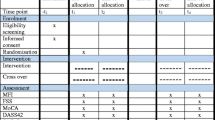Abstract
Post-stroke objective or subjective fatigue occurs in around 50% of patients and is frequent (30%) even after minor strokes. It can last more than one year after the event, and is characterised by a different quality from usual fatigue and good response to rest. Associated risk factors include age, single patients, female, disability, depression, attentional impairment and sometimes posterior strokes, but also inactivity, overweight, alcohol and sleep apnoea syndrome. There are few therapy studies, but treatment may include low-intensity training, cognitive therapy, treatment of associated depression, wakefulness-promoting agents like modafinil, correction of risk factors and adaptation of activities.
Similar content being viewed by others
References
Staub F, Bogousslavsky J (2001) Fatigue after stroke: a major but neglected issue. Cerebrovasc Dis 12:75–81
Guessous I, Favrat B, Cornuz J, Verdon F (2006) [Fatigue: review and systematic approach to potential causes]. Rev Med Suisse 2:2725–2731
Glader EL, Stegmayr B, Asplund K (2002) Poststroke fatigue: a 2-year follow-up study of stroke patients in Sweden. Stroke 33:1327–1333
Carlsson GE, Möller A, Blomstrand C (2003) Consequences of mild stroke in persons <75 years — a 1-year follow-up. Cerebrovasc Dis 16:383–388
Schepers VP, Visser-Meily AM, Ketelaar M, Lindeman E (2006) Poststroke fatigue: course and its relation to personal and stroke-related factors. Arch Phys Med Rehabil 87:184–188
Gramigna S, Schluep M, Staub F et al (2007) [Fatigue in neurological disease: different patterns in stroke and multiple sclerosis]. Rev Neurol (Paris) 163:341–348
Naess H, Nyland HI, Thomassen L et al (2005) Fatigue at long-term follow-up in young adults with cerebral infarction. Cerebrovasc Dis 20:245–250
van den Werf SP, van den Broek HL, Anten HW, Bleijenberg G (2001) Experience of severe fatigue long after stroke and its relation to depressive symptoms and disease characteristics. Eur Neurol 45:28–33
Choi-Kwon S, Choi J, Kwon SU et al (2007) Fluoxetine is not effective in the treatment of post-stroke fatigue: a double-blind, placebo-controlled study. Cerebrovasc Dis 23:103–108
Hsu CY, Vennelle M, Li HY et al (2006) Sleep-disordered breathing after stroke: a randomised contraolled trial of continuous positive airway pressure. J Neurol Neurosurg Psychiatry 77:1143–1149
Schwartz JE, Jandorf L, Krupp LB (1993) The measurement of fatigue: a new instrument. J Psychosom Res 37:753–762
Brioschi A, Gramigna S, Werth E et al (2008) Effect of Modafinil therapy on Subjective Fatigue induced by Stroke, in the brainstem, the thalamus and the cerebellum: preliminary data. Oral Communication, Swiss Stroke Trialists’ Meeting GSC, 25 January 2008
Giliessen MF, Verhagen CA, Bleijenberg G (2007) Cognitive behaviour therapy for fatigued cancer survivors: long-term follow-up. Br J Cancer 97:612–618
Author information
Authors and Affiliations
Corresponding author
Rights and permissions
About this article
Cite this article
Annoni, JM., Staub, F., Bogousslavsky, J. et al. Frequency, characterisation and therapies of fatigue after stroke. Neurol Sci 29 (Suppl 2), 244–246 (2008). https://doi.org/10.1007/s10072-008-0951-0
Published:
Issue Date:
DOI: https://doi.org/10.1007/s10072-008-0951-0




